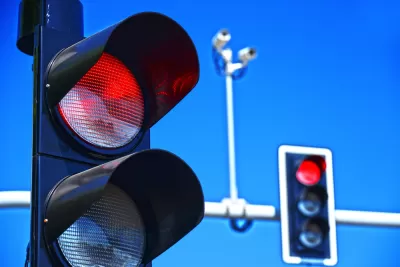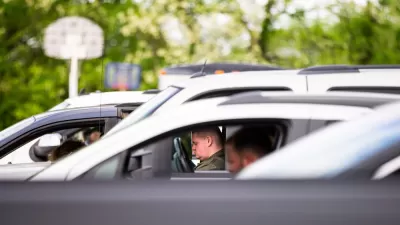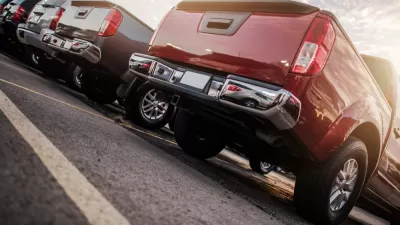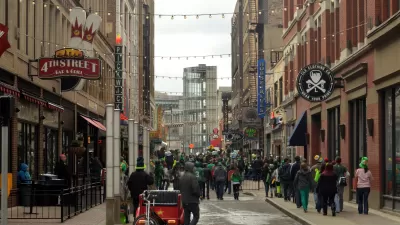Reducing car dependency is a vital climate goal. Many U.S. cities want to shift trips to other modes, but they're often held back by state governments.

Local officials are rethinking their streets, aiming for fewer cars and more sustainable ways to get around. But some state governments are keeping cars in control, reports Sarah Wesseler in Yale Climate Connections.
In recent decades, many local governments have made increasingly ambitious pledges to nudge their residents out of their cars. Motivated by concerns like climate change, urban sprawl, and traffic deaths, U.S. cities are trying to make it easier for people to get around on public transportation, on foot, and by bike. Within the past five years, even famously car-centric cities like Houston and Phoenix have announced goals to significantly cut down on driving.
These efforts could add up to substantial climate benefits. Transportation is the nation’s largest source of planet-warming gases, and the everyday vehicles most Americans rely on are the biggest source within the sector. According to think tank RMI, cars and trucks were responsible for almost 40% of all U.S. emissions in 2019. Shifting to electric vehicles will greatly reduce these emissions, but it won’t eliminate them; car use also needs to fall.
But state governments often impede progress. States largely control transportation funding in the U.S., and their spending patterns are heavily weighted toward car infrastructure rather than public transportation or complete streets.
State/city conflicts over urban transportation play out in different ways across the country. In New York, Governor Kathy Hochul's recent decision to pause congestion pricing in New York City has been denounced by many local officials. In North Carolina, state lawmakers' insistence on prioritizing cars has called into question Charlotte's plans to build a light rail network spanning the city.
Not all states block efforts to reduce driving, however; some have developed innovative ways to support this goal. Washington has a long-standing program focused on reducing solo commute drives, and the Seattle government has reported significant reductions in single-driver commutes within its borders as a result. Colorado recently passed a bill that will impose fees on oil and gas extraction to help fund local public transportation.
FULL STORY: Cities are trying to cut down on cars. Some states are standing in their way.

Alabama: Trump Terminates Settlements for Black Communities Harmed By Raw Sewage
Trump deemed the landmark civil rights agreement “illegal DEI and environmental justice policy.”

Study: Maui’s Plan to Convert Vacation Rentals to Long-Term Housing Could Cause Nearly $1 Billion Economic Loss
The plan would reduce visitor accommodation by 25% resulting in 1,900 jobs lost.

Planetizen Federal Action Tracker
A weekly monitor of how Trump’s orders and actions are impacting planners and planning in America.

Study Links Covid and Poor Driving
The effects of the virus, including ‘brain fog,’ can make driving more difficult and dangerous.

Waymo Gets Permission to Map SF’s Market Street
If allowed to operate on the traffic-restricted street, Waymo’s autonomous taxis would have a leg up over ride-hailing competitors — and counter the city’s efforts to grow bike and pedestrian on the thoroughfare.

Parklet Symposium Highlights the Success of Shared Spaces
Parklets got a boost during the Covid-19 pandemic, when the concept was translated to outdoor dining programs that offered restaurants a lifeline during the shutdown.
Urban Design for Planners 1: Software Tools
This six-course series explores essential urban design concepts using open source software and equips planners with the tools they need to participate fully in the urban design process.
Planning for Universal Design
Learn the tools for implementing Universal Design in planning regulations.
Caltrans
Smith Gee Studio
Institute for Housing and Urban Development Studies (IHS)
City of Grandview
Harvard GSD Executive Education
Toledo-Lucas County Plan Commissions
Salt Lake City
NYU Wagner Graduate School of Public Service





























